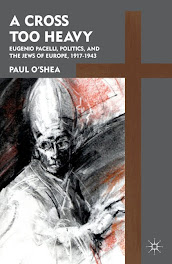Reference: Report 21/40 (AES
3267/40)
Location and date: Angers,
02.04.1940
Summary statement: Members
of the Polish government condemn the article in Glos Polski and precautions have been taken. Pope’s concern for Poland has been mentioned
in many official statements.
Language: Italian
Text:
I reply with some delay to
message 2476/40, regarding the article of the Polish newspaper Glos Polski (Voice of Poland) – on the
visit of the German Minister of Foreign Affairs to the Vatican (1). The delay is due, in part, to the slow nature
of the Polish people, who always say jutro,
“tomorrow”, and partly to the scattered location of the various offices and of
responsible people who reside anywhere between Paris and Angers and are
difficult to meet.
And now, here is what I
report to Your Eminence.
The Glos Polski is printed in
Paris, where all its writers and editors live.
The paper is in contact with the Propaganda Ministry – a beehive of
ultranationalist elements. Because of
these contacts and also because the paper prints public notices about
Government officials and audiences of the Polish President, it has gained a
sort of semi-official character.
Moreover, in Paris the Polish writers often meet the French newspapermen
with left wing tendencies: this explains the tinge of certain opinions and
feelings.
As soon as I arrived in
Angers I Immediately considered what would be the best way to call the
attention of the Government to the article in Glos Polski. However, I
found a very different climate here than the one I noticed in Paris and the
article either had not been noticed or had already been censured. (The Polish papers, of which a considerable
number are published, are read very little by the Polish people themselves, who
prefer the French papers, even when they only have a little knowledge of this
language).
The first person to be
surprised when I spoke to him about it, was the Foreign Minister as I had the
honour to mention in my report 14/40 of 19 March (2) the article – he said – “has escaped me and I
am very sorry, because all of us here are convinced that the Holy Father has a
great love for Poland”. The Welfare
Ministry, mentioned in my report 16/40 of 27 March, expressed similar
thoughts. Many other persons were also
surprised.
On 28 March, as soon as I
received your message, 2476/40 (3) I went to the office of the President of the
council of Ministers, where there is also the Press Relations office, to
protest the incident. The Director
General, Count Romer, who frequently deputises for General Sikorski who mainly
looks after military affairs and is always busy with inspections, received me
(4). Count Romer had not read the
article in question and was shocked when I read it to him. He declared wonderment as to how such an
article could have been written, saying they would ask for immediate
satisfactory explanations.
He in fact wrote a letter to
the Propaganda Ministry in Paris at once, asking for explanations and how they
proposed to remedy the matter. He also
enquired about the writer of the article, severely criticising the Editor of
the paper.
The Propaganda Minister
replied deploring the article – which had also escaped his notice and he
apologised for that (5). He has
reprimanded the Editor in chief of the newspaper for not having shown the
article to him first, since it dealt with such a delicate matter; he has also
expressed in stronger terms, a reprimand for the writer, instructing that
articles of his should no longer appear in the newspaper which is now being put
under the direct control of the Propaganda Ministry. A Polish censor will examine it (up until now
only a French censor examined it) with instructions to watch carefully that
nothing that offends Polish feelings be printed. He mentioned that distribution of Glos Polski has been forbidden to
soldiers. Finally the Propaganda
Minister has ordered a series of articles be written to offset as far as
possible the painful impression which the article might have given to public
opinion. I enclose the most important
paragraphs of the first such articles with this report.
Furthermore, the Minister
for Foreign Affairs, M. Zaleski, addressed words of respectful homage and
thanks to the August Pontiff on behalf of the entire Polish nation in a speech
he made to the Polish National Council on 28 March. I reported this in my submission Number
20/40. On 31 March the Propaganda
Minister broadcast a speech where he spoke about the benevolent attitude of the
Holy See towards Poland and of the affection of Poland for the Holy See. At its General meeting in Angers on 2 April,
the Polish National Council unanimously acknowledged the work done by the Holy
Father in favour of Poland and addressed to him devoted words of homage, thanks
and filial affection. M. Paderewski,
Vice-President of the Council, who does not participate actively at the meeting
because of his age and ill health and now lives mostly in Switzerland, reported
these matters to me personally (6).
I hope these manifestations
of filial devotion to the August Pontiff from the highest Polish Authorities
can alleviate the distress felt by the Holy Father.
Notes:
(1) ADSS 1.273
(2) Not published in
ADSS. August Zaleski (1883-1972) Polish
Foreign Minister in Exile 1940-47.
(3) ADSS 1.273
(4) Tadeusz Romer
(1894-1978), Director General in Exile 1939-42; Wladislaw Sikorski (1881-1943),
Polish Prime Minister in Exile 1939-43.
(5) Polish Propaganda
Minister
(6) Ignacy Jan Paderewski
(1860-1941), Chief of the National Council of Poland 1939-41.




No comments:
Post a Comment
You are welcome to post a comment. Please be respectful and address the issues, not the person. Comments are subject to moderation.